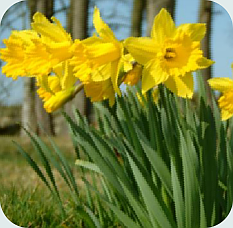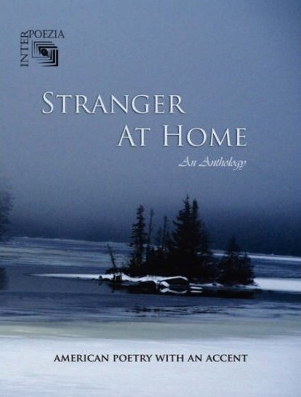Spring 2009
Table of Contents - Vol. V, No. 1
Poetry Interview Translations Fiction Book Reviews
Dan Cuddy
Stranger At Home, An Anthology: American Poetry With An Accent, edited by Gritsman, Weingarten, Brown, Firan. Interpoezia Inc. and Numina Press, New York 2008, $15.95.
The anthology presents English poems by poets for whom English is a second language, though the poets in this book are, for the most part, as fluent in English as any native born speaker. The most recognizable names are Nina Cassian, Andrei Codrescu, Anselm Hollo, and, for Maryland readers, Danuta E. Kosk-Kosicka. The range of poetry is from the superbly written traditional pantoum “Stillbirth” by Laure-Anne Bosselaar to poetry that leaps with irrationality like the phrases of Codrescu.
A main editorial concern was to present immigrant voices that show both a mastery and a metamorphosis of the English language. Though Andrey Gritsman asserts in his introduction that poems can not be translated from one language to another, the non-native poets retain much of their previous sensibility and adopt the new culture, its concerns, expressions, producing an accented voice that is as rich tasting as an ethnic dish. Of course poetry is not a trivial foodstuff but the pulse of being human made vocal. The poets in this anthology run the gamut from being as American as any native born writer to being the voice of the immigrant trying to fit into the new society. Wang Ping in a poem titled “On A Playground in Park Slope, Brooklyn, A Retired Neurologist From Beijing Is Cursing” starts off like this:
Stop fidgeting. And stop
Whining about your sore feet.
If your mother hadn’t left you outside
A shoe factory, dumping you like bad luck,
You’d be digging mud and collecting cow dung
In some godforsaken place.
And after many very vivid lines contrasting the life the little girl would have had in China with the life as an adopted child, the poem ends with these lines:
So Lili, my silly pumpkin face,Wipe your nose and walk.
Time to practice again.
You’re stubborn, and proud. Good!
Don’t ever let your parents’ frown seal your lips.
Don’t let their butter and steak mush your brain.
You’re Chinese, a Chinese peasant girl.
Now take your steps.
It’s all right to stumble, to fall.
Here’s my hand.
Take it.
I’m your countrywoman.
I am your Mother.
The poets come from Asia, Russia, Eastern and Central Europe, South America. There are poems with the heaviness of Holocaust memories on their hearts. There is a poem that gives a unique treatment to the 9-11 tragedy. There is a poem titled “Photograph Of Myself, Age Four, Asleep In My Father’s Arms”. There is the poem “Florida” by Adrian Sangeorzan which sums up one type of immigrant experience.
When we grow oldWe’ll retire to Florida.
At first we’ll send our spirits there
On short holidays
In search of youth without aging
And life without death.
We are a generation with strong and white bones
We invented hurricanes, globalization and saltwater
That we will pass on
To our children or to some foundation
Which will love us with moderation.
The hot sand and the sun will remind us of
The 60’s, feminism and the sexual revolution
When the spoiled hormones of communism
Swarmed under our skin giving us true sensations
Which our mothers unaware
Greased up with butter
On our bread.
Today everything in America is big
The towers, the beaches, people’s bellies
The toilet seats
The ideas working on steroids
Only the spirits still play in the sand
With golden pickaxes.
This is the place for the great retreat
The last survivors
Cured of all of life’s melanoma
Quietly play bridge at the edge of the world
Their nephews listen to hip-hop on iPods.
We are all so digitalized.
Seagulls blinded by cataract perch
On Poseidon’s back
Whose only remains are a floating shoulder blade
And the name of a casino.
We are the next elephants
We’ll slowly migrate to Miami
Through the slippery funnel of America.
We still make love without Viagra
Right on the coils of the old watches
Which we’ll wind up
They’ll continue to tick under our king-size beds
Like a Chinese perpetual mobile.
On the beach the sand
Escaped from hourglasses
Will build solid castles
Where all the world’s languages will be spoken
From which we’ll choose for our ears
Some gorgeous coral idioms.
During our last years
We will tan well all over
We will cremate ourselves unnoticeably
More beautiful than Tutankhamen.
The book is 152 pages of poetry and occasional commentary by some of the authors on what they feel their relationship is to language. Alexei Tsvetkov writes “Learning the art of poetry in a nonnative language is…akin to learning an entirely new kind of art, not unlike trying to become a musician after a lifetime of painting, and much of similarity is deceptive.” However, the poets in this anthology make it look easy because there is quality poetry here.
There is another aspect to this book, which makes it even more valuable to read, and that is the presentation of so many different styles and approaches to poetry. Some of the poets have been grounded in Russian absurdism and like movements. Here are a few stanzas from Eugene Ostashevsky’s “Ballad”
I was attached to a rock like a limpet
Around me ran waters limpid
I could not move not even limping
I became Eleatic and Olympic
I could not C
I could not D
I could not E
I could not F
I saw a knight
Of special K
He wore a scuba
He was OK
I took his scuba
His face turned blue
I cried, Where are you
Scooby-Doo?
The above is not the traditional poetry of English 101 but it is verbal play and smacks of contemporary sensibility.
The anthology presents diverse styles, voices, influences. Any reader who loves poetry will find treasure in this book. Perhaps a poem or two will open new doors of appreciation. Just as these poets came as immigrants to a new country and language, so too should readers come and experience and adapt themselves to these new poetic visions. Human experience is not static.
© Dan Cuddy

